The Library of Spanking Fiction: Wellred Weekly
|
||||||
|
Articles
Items of interest regarding all things spanking
|
||||||
|
|
Corporal Punishment in Schoolboy Fiction (cont.) If there were a prize for the most references to corporal punishment in a boys school story Ernest Raymond's rather long-winded but amusing account of school and war called Tell England would be in the running. The school is Kensingtowe, "the finest school in England". Rupert Ray, our hero is caned by his hero, Mr Radley for some minor offence then later that day soundly thrashed again for altering the classroom clock. Soon afterwards he gets ten of the best for alleged impertinence from his housemaster. He strongly disapproves of his housemaster because the poor chap wears "carpet slippers" and only canes them feebly unlike good old Mr Radley who knows how to administer a good hard caning. I strongly suspect the hero of this tale has flagellant tendencies. Ray's best pal Doe (interesting choice of name) is another chap who enjoys a good beating. Especially from the athletic Mr Radley: "Do you know I think I love Radley better than anyone else in the world. I simply loved being whacked by him." Mr Radley, after awarding an extra hard caning to the pair says: "You are two plucky boys." They are indeed plucky boys and the story has a 'ripping yarns' feel to it. Kensingtowe with all that whacking on both hands and bottoms is obviously training its boys to help run the Empire and fight a war that will shortly consume so many young lives. I won't tell you what happens when the two chaps go off and fight in what we now call the First World War but what the boys' Colonel tells them on the eve of battle is well worth repeating. It reads like something General Melchett might have said in the last ever episode of Blackadder. "You've timed your lives wonderfully my boys. To be eighteen in 1914 is the best thing in England. England's wealth used to consist in other things. Nowadays you boys are the richest things she has got. Eighteen years ago you were born for this day. Through the last eighteen years you have been educated for it. Your birth and breeding were given you that you may officer England's youth in this hour." Tell England possesses an idealism and innocence which sounds strange to us ninety odd years after it was published. However, such idealism was common enough in the boys' school stories of the early twentieth century if you were to read any of the boys' periodicals from that time. In storypapers, such as The Captain and Chums, you would find a rich vein of jingoistic patriotism. Doubtless you would find many well-described thrashings as well. It was as if the boys needed to be toughened up for the Empire. However it seems no one at that time had read Rousseau. There is no hint (with the possible exception of the above mentioned Doe and Ray) that either master or boys enjoyed the beatings. It was all terribly innocent. 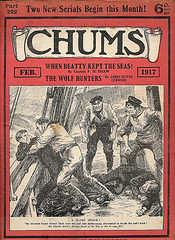 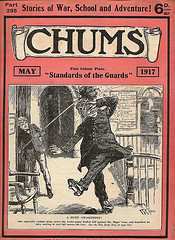 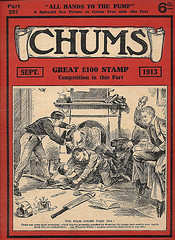 Innocence also permeates through another one of my favourite school stories, Hammond's Hard Lines by the strangely named Skelton Kuppord (a pseudonym for Sir John Adams) which was published in 1894. It is one of the few school stories which is also a fairy tale and concerns the fate of young Tom Hammond locked in the punishment cell by his headmaster and granted three wishes by a passing fairy. What I love about the book is its humour but it has no shortage of references to caning. "I need not go into the details of what followed. But if I had been one of the directors of the company with which Doctor Ackroyd's life was insured, I would have been very anxious for a little while. Indeed, I think life assurance companies would be wise if they agreed amongst themselves never to pay anything to friends or relatives of fat schoolmasters who die of apoplexy in the act of caning. At the very least they should put fat schoolmasters among those whose lives are called extra hazardous." With the exception of the Charles Hamilton (Frank Richards) stories there is very little mention of women administering punishments to young males. The only book I have found is Kim's Last Whipping. It was published in 1878 in Glasgow, is set in 1860's America and tells the tale of a high spirited boy, Kimball Price, who is the naughtiest boy in the school and frequently caned by his stern young schoolmistress, Miss Pentecost. It is slightly similar in style to Laura Ingalls Wilder's Little House on the Prairie. The characters are all desperately poor but God fearing. It should perhaps be considered more a religious tract than a traditional school story. "She liked Kim - everybody liked him; but that was no reason why he should be allowed to tie girls together by their hair or fire paper balls or stick pins in the benches. Miss Pentecost never winked at naughtiness and as whippings were fashionable at that period she whipped Kim regularly three times a week. It was considered the most direct way of reaching the conscience." Miss Pentecost has a very real affection for the naughtiest boy in her class but that doesn't stop her doing what needs to be done and ensuring all Kim's punishments are as painful as possible. "Next day was time for one of Kim's regular whippings. He had been more trying than usual, and Miss Pentecost sent Bob Whiting out for a remarkably strong birch stick which could express her feelings better than the old one which stood in the corner. She spent some time in trimming the new twig, though she was careful to leave a few little knots on it, which would give emphasis to the blows. 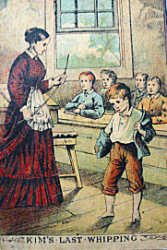 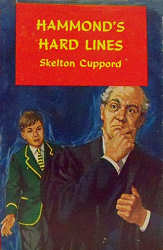 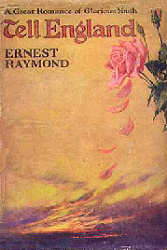 Often, corporal punishment was not described in any detail. It happened off-stage. Sometimes one almost feels the author is slightly embarrassed to have even mentioned it at all. In this day and age it all seems a million miles away but then it was just another part of school life. Maybe even then writers of school fiction scented something vaguely disturbing in boys being beaten. It wasn't as if it was a quick clip round the ear. It was a ritualised and very formal event. A boy would usually bend over a desk or a chair and a set number of strokes would be given with a cane or slipper, often long after the original offence. In much school fiction corporal punishment seems to be considered as something to toughen boys with, as if to mould character. The school spirit was very much in evidence in a turn of the century work, Rudyard Kiplings' Stalky and Co, where the headmaster thrashes the boys for no offence at all. The boys admire him all the more because of it and when later he canes the entire school he receives a great ovation, "the boys awaiting their turn cheered and flung themselves upon him to shake hands." Authors did at least attempt to reflect some of the realities of a schoolboy's existence at that time. In real life few boys could have escaped being subjected to corporal punishment at some time or other if they went to a traditional English boarding school. Such schools were full of snobbery, bullying, lack of privacy and dreadful food. Beatings were seen as good for a boy's moral character. If you could take your punishment without fuss you would be admired and the slate would be wiped clean. Of course fiction being fiction, some of the more uncomfortable sides of school life were often omitted, although books such as Alec Waugh's Loom of Youth did attempt to show the darker side (and very little thanks did he ever receive for it). As one good friend of mine said of his own boarding school days: survive that and you can survive anything! For anyone wishing to find out more about schoolboy fiction may I suggest they buy a copy of Robert J. Kirkpatrick's excellent Encyclopedia of Boy's School Stories published by Ashgate Publishing. And if you are browsing second-hand bookshops look out for old copies of The Captain and The Chums which shouldn't cost a lot and contains lots of school stories, some of them pretty dreadful but others well worth reading. 23 comments:
PinkAngel said...
Very informative and well written with hints of your usual self deprecating manner. From someone who was at boarding school when CP was banned, I am very glad I didn't go to any of the schools in this article! Thank you for an excellent article. 22 March 2013 20:11
gail said...
This was really educational...I have never before seen an analysis like this. Thanks for putting it together!! 22 March 2013 22:43
patxi said...
I have written before (Wellred 2) of my first two years’ experience of traditional boarding school discipline and its effects. What irritates me about these ‘stories’ (before putting the book down in disgust) is the underlying assumption that the beating of boys was a good thing, made you into a man, ready to be sent out to take control of vast tracts of native territory with powers of life and death over the indigenous population and the nearest white neighbour 200 miles away, “Take up the white man’s burden”..... Had these men, these schoolmasters, these romanticising story-tellers but known it, they were playing with fire: not to cause development of character but regression. Sure, Alec Waugh tried to tell the truth but the tradition was too well ingrained. Anyone who wishes to confront the real truth should read ‘The Public School Phenomenon’ by Jonathan Gethorne-Hardy: published in 1977 but now I believe sadly out of print. I got my copy through Amazon and my local library has one so hopefully it is still freely available. It deserves to be. All the issues and writers mentioned in Mr.Blimp’s article are discussed at length, as are the psychological implications, naturally in too much of detail to be described here. An account of the discipline inflicted on boys in these establishments in earlier times will make your hair stand on end. Also there are several chapters on girl’s boarding schools which are very well worth reading. 23 March 2013 10:56
Lincoln said...
This was very much a trip down memory lane for me. In my prep school we devoured the exploits of Teddy Lester, from when he joined as a new boy and ended up head of house. Being a superb rugby player and cricketer didn't spare him from frequent canings from masters and prefects. I never read the famous (or infamous) "Little by Little". Those of my contemporaries who had said it was a "load of tosh" and I took their word for it. My granny had a set of bound copies of the "Boys own Paper" which belonged to my two uncles when they were young. Covering WW1 years they satisfied my then interest in CP as they had a myriad of serialised boys' school stories. A great article - well done! 23 March 2013 15:05
blimp said...
Gathorne Hardy is a good writer. I remember reading the book you mention soon after it came out. Inevitably writers romanticised tales set in boarding school but you can't really lump them all together. Authors like Waugh, Bruce Marshall and David Benedictus showed the darker side of school. My favourite work of school fiction (aside from Billy Bunter) is an adult tale that gives what I think is a fairly balanced view of school life, Lord Dismiss Us by Michael Campbell. I don't think children wanted to read the truth about boarding schools, I think they just wanted to be entertained. It's no point looking at them with a critical eye circa 2013 because we now live in a very different world! 23 March 2013 17:34
yenz said...
The mentioning of Kipling's "Stalky and Company" makes me think of an autobiografic book, which I read many years ago in a Danish translation; it was written by a highranking officer, who was the Stalky, who went to school wit Kipling. He writes, that he years after school met his former teacher and asked him, whether it was true, that he had put chalk on the cane in order to hit the same spot again. But the old teacher denied this, he said, it was just enough to have a sharp eye..Kiplin wrote. that they had to wash the blood away afterwards. 24 March 2013 15:17
patxi said...
Unfortunately the tradition of chalking the cane was still in force in my first couple of years. Osbert Lancaster in his memoirs recalls the same experience during his years at Charterhouse. Yes I agree that children just wanted to be entertained. Before being sent away to school I was an avid reader of ‘Wizard’, ‘Hotspur’, ‘Rover’, with their canings galore. Gathorne-Hardy reckons such stories filled up 60% of space but as he points out these comics and books were being read by children with no experience of the reality. There weren’t many comics in evidence at my school and the romantic tales with their schoolboy heroes facing yet another character-building beating would have been dismissed as ‘a load of tosh.’ The reality was too plain. The distasteful fact to contemplate is of a lower class youngster enthralled in the antics and ideals of an upper class youngster which simply weren’t there. George Orwell had much to say on this. When eventually I left school, I stayed with a family by no means well off, for a year. They had two twin boys age 12/13 who regularly brought home such books as these (the shelves of the local children’s library must have groaned with them) and they would sit by the fire happily reading: all of them very much of a kind and some with quite ferocious beatings, or so it seemed to me. Of course I said nothing. Why disturb the dream? They were content, they were bitten with the reading bug. What more could you want? I will look out for the work of Michael Campbell. Thank you for bringing it to my attention. 24 March 2013 17:36
blimp said...
I should have thought for most of the last century children from less well to do homes were subject to corporal punishment at school as well as those boys sent away to boarding school. As a child you just accepted that you would go to school to learn and whilst there you would be whacked! If you were the sort of kid that never got whacked by those that taught you, you would inevitably get thumped by the other kids. You wouldn't question the rights or wrongs of it.That was the way it was and everybody accepted it even if they didn't agree with it. I am not sure kids were ever so naive as to believe boarding school would be like Greyfriars or Mallory Towers. No one ever believed in Father Christmas beyond the age of eight after all (except for Her Pinkness of course!) 24 March 2013 18:34
Guy said...
Thank you! This is not only informative, but (being among my favorite topics) riveting reading. Like others, I'm happy to have missed the times when that sort of treatment was a common part of the educational process. 25 March 2013 17:29
bendover said...
Great article, Arthur. I remember trying to find anything I could in the way of corporal punishments in books. I don't know how I would have felt being punished in that fashion in school, especially in plain sight. I never was, but if the time ever came, I would have refused and took my suspension. Another eye opener even though it was fictional. In many ways throughout the world it must be non-fiction for many. 26 March 2013 18:30
Linda said...
A most enjoyable and informative article. I, of course, read Girls' School stories, and never in Mallory Towers or St Clare's was there a threat of corporal punishment - at least, not from the staff. However, I do recall the girls in the dormitory threatening to spank the dreadful Gwendoline Mary with a hairbrush. In another of Miss Blyton's books - I think 'The Children of Mistletoe Farm' - the eldest son of the family, agonising over something he had done wrong, resloved to own up to his father, even although he knew he "would get the most dreadful telling-off, and maybe even a beating." Much to my disappoingment, the 'beating' never materialised. I also recall in Louisa May Alcott's 'Little Women', Amy was caned on the hands for the dreadful crime of bringing pickled limes to school! Needless to say, I re-read that chapter many times. Thank you again for such an interesting article. 26 March 2013 19:11
blimp said...
Linda- Enid Blyton was a terrible tease like that. I remember reading one of her tales in which a boy forgets his hanky so regularly the young schoolmistress threatens him with a spanking if he forgets it the next day! Of course he does forget it but somehow escapes the spanking! However the sense of anticipation was so wonderful I must have read it twenty times at least. I read all the Mallory Towers books and the St Clares. My impression was one of the matrons was always threatening to dish out a spanking but time has probably dimmed my memory. 26 March 2013 22:21
ordalie said...
I wrote down all those books the commenters alluded to since I'd never heard of them. 31 March 2013 11:33
mati said...
That was an extremely interesting and well written article, especially as I didn't know anything about this genre so far. I wonder if this type of school-boy stories is a British speciality? I can't think of similar German books. Perhaps being a girl I just missed them, but I had an older brother and read ALL his books, so I should have noticed it. Anyway, your article inspired me to do a little bit more further research. Thank you. 11 April 2013 08:27
blimp said...
Mati-Have you read Young Torless by Robert Musil! It's set in a military academy rather than school and I think Musil was Austrian rather than German. It's very disturbing and I suppose it can't really be compared to the boys school stories I have mentioned but it does have at least one caning scene. 11 April 2013 09:31
mati said...
Arthur, I know that book for sure, but I agree that you can't compare Musil with the boys school stories you mentioned. If I remember it correctly the caning scene was between the boys themselves. They bullied and blackmailed a young thief, ordered him to the attic of the school, whipped him and abused him sexually. I think the most important difference to the british school boy stories and the school stories of Thomas Mann (Hanno Buddenbrook f.e., Hesse (under the wheel) and Musil's Törless is, that they all deal with the dark - and as you said disturbing - side of their sexuality and are very critical about the education in boarding schools. They are all about sensitive boys broken by an inhuman system. And on the other side we have the adventure books f.e. from Karl May (Winnetou). They have a lot of CP in it, but unlike to what you wrote the heroes are not on the receiving end, they are dishing out. 11 April 2013 10:29
Ernest said...
I am delighted to have met someone else who has discovered the spanko side of "Tell England". It is indeed a remarkable book, even for the 1920s. In its implications, it is unbearably sad, but he certainly risks making it into a completely different kind of book, in those early chapters. Have you read any of Ernest Raymond's other books? As a teenager I had a period of reading a large number (he was writing all the way from 1922 to the early 1970s), and dotted around in them are small references (nothing so blatant as those in "Tell England") which make me fairly sure he was a closet spanko! Sometime I will make a list of all those I can remember. They are Mf and Fm , as well as the Mm in "Tell England". When I came to choose a nom-de-plume for contributing comments to spanking blogs - you see what I chose, in his memory! 18 July 2013 06:40
blimp said...
No Ernest I haven't although I like to read a lot of fairly obscure authors from that time. I will look out for his other books. I particularly enjoy school stories, authors like Philip Toynbee and Simon Raven are well worth reading. 22 August 2013 19:36
KatiePie said...
Thanks for this article. I was (and still am) a big fan of the school story genre. I had inherited my Mother’s childhood books and then augmented them by scouring secondhand bookshops. The coming of internet shopping has now made it easier to search and buy. I mainly read girls’ books but had Tom Brown’s schooldays, quite a lot of Billy Bunters and all the Jennings books. There is a mention of Jennings being caned in one of them and another where he fears he’ll be caned and puts on two pairs of underpants but gets let off. As a secret spankophile it was always disappointing that the girls’ stories didn’t include any cp. The Chalet school books, spanning many years and talking about family life as well, occasionally mentioned a young child being spanked by a parent or a father caning a girl’s brother. There was one story where a father caned a girl’s hands before sending her away to boarding school. 15 March 2020 07:14
mobile_carrot said...
Katie, I don't recall the girls' boarding school stories EVER featuring CP. The British boarding school systems were very different for boys and girls - boys were being raised to be empire-builders, leaders of military and industry and needed to be resourceful and resilient in the face of lots of potential whackings. Girls, on the other hand, were fragile fair flowers of maidenhood who would dissolve if they were given a conduct mark or a demerit. They weren't been trained to lead or even hold down a job, needless to say. The "Billy Bunter" stories had a parallel series set in a girls' boarding school nearby, which was attended by Billy Bunter's sister Bessie, and were written by the same (male) author. When I lived in Leeds the city library had facsimile copies of the original comics featuring Bunter stories set into books, and I would often read one. One particular issue had a front cover from the companion comic featuring the Bessie Bunter stories which showed one of the Cliff House girls breaking a cane over her knee, so I can only suppose there was a storyline featuring some element of caning being introduced there, and successfully resisted by the girls, but sadly this is just a memory and I have never found any other reference to it. Obviously there is now a whole host of girls boarding school stories featuring vigorous caning, but these have AFAIK all been written by modern kinksters like me and is more wishful thinking than historical reality. 19 March 2020 13:40
Brosse6 said...
You are correct mobile_carrot. However I would add that over the years and on my travels I have met a few girls who were schooled in colonial and post-colonial Africa who told me that they were caned at school, both on the hands and across the knickers. Many were also spanked at home well into their late teens. 19 March 2020 15:51
TheEnglishMaster said...
I'm puzzled as to how I failed to comment on this when it first came out in those halcyon days of regular new editions of Wellred Weekly. This is a brief but scholarly study of the genre presented in AJB's inimitably self-deprecating style, including moments of insight into where he might have got some of the inspiration for his own brilliant schoolboy stories (Miss Pentecost, anyone?). 21 March 2020 21:41
BlooDenim said...
I looked at "Skelton Kuppard" and with my twisted mind it became instantly apparent that Skeletons were coming out of the cupboard.. Were it me writing, I would have assumed such a punny malapropism and thought my wit would be shared and enjoyed. 28 July 2020 14:39
You need to sign in if you wish to make a comment   |
|||||
| Pages: 1 2 3 4 5 6 7 8 9 10 11 12 13 14 15 16 | ||||||


